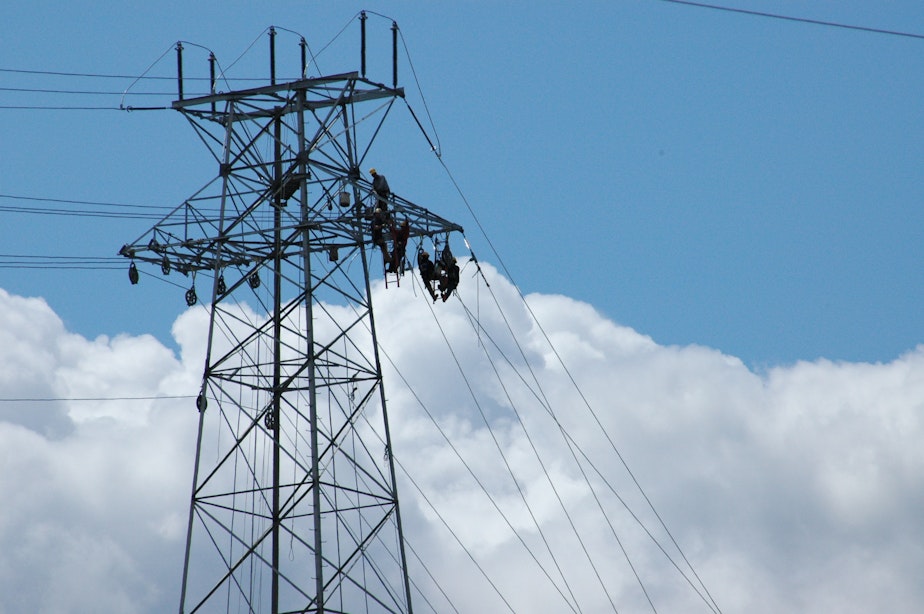Feds Ban Free Climbing By Electric Utility Workers

The Obama Administration is putting an end to the common practice of "free climbing" by electrical lineworkers. Seattle City Light and other electric utilities let their lineworkers climb transmission towers without using safety harnesses.
For most jobs that involve climbing, federal law mandates harnesses or other safety equipment any time employees are a few feet off the ground.
Workers on cell-phone towers have had to climb that way since the mid-1990s.
But electrical workers get to climb like daredevils on their way up and down transmission towers.
KUOW documented the common practice in our “Danger At Work” investigation in 2011.
Listen to Part One of Danger At Work:
"Right now they're at about 180 feet," Seattle City Light crew chief Marshall Jensen told me then as we watched his crew of lineworkers free-climb high above the Seattle Ship Canal.
"They climb up one leg of the tower on little bolts, step bolts they're called. Once they're up there, then they can belt off. But all the way up it's a free climb,” Jensen said. “So far, no one's gotten hurt.”
The Occupational Safety and Health Administration announced wide-ranging new safety rules for electrical workers in April, to take effect this month. Free climbing is prohibited, with limited exceptions. OSHA is giving employers until April 2015 to comply with the new rule.
For now, free climbing is still a common practice on electrical transmission towers. Seattle City Light and Portland-based Bonneville Power Administration allow it. Puget Sound Energy said its transmission-line contractor, Sumner, Washington-based Potelco, has stopped the practice in the past year.
“Nationwide, not necessarily with Puget Sound, there have been fatalities on pretty much an annual basis where people fall and, if they had had some sort of fall protection, they would have not fallen all the way to the ground,” said Ryan Blood with Puget Sound Energy.
Seattle City Light and Puget Sound Energy both try to send workers aloft in bucket trucks whenever possible to minimize the amount of climbing, according to company officials.
No electrical lineworkers in Washington state have died on the job in the past decade, according to the Washington Department of Labor and Industries.
Nationwide, an average of 74 electrical lineworkers a year die on the job from various causes, including electrocution and falling, according to OSHA.
About 110,000 people work at installing and repairing the nation’s power lines, poles and towers.
The federal safety agency estimates the new rules should save 20 lives a year -- if electric utilities and their contractors actually follow them. Telecommunication companies have a spotty record of following that industry’s stricter safety rules. Fourteen workers died in cell-tower accidents last year, according to ProPublica.

